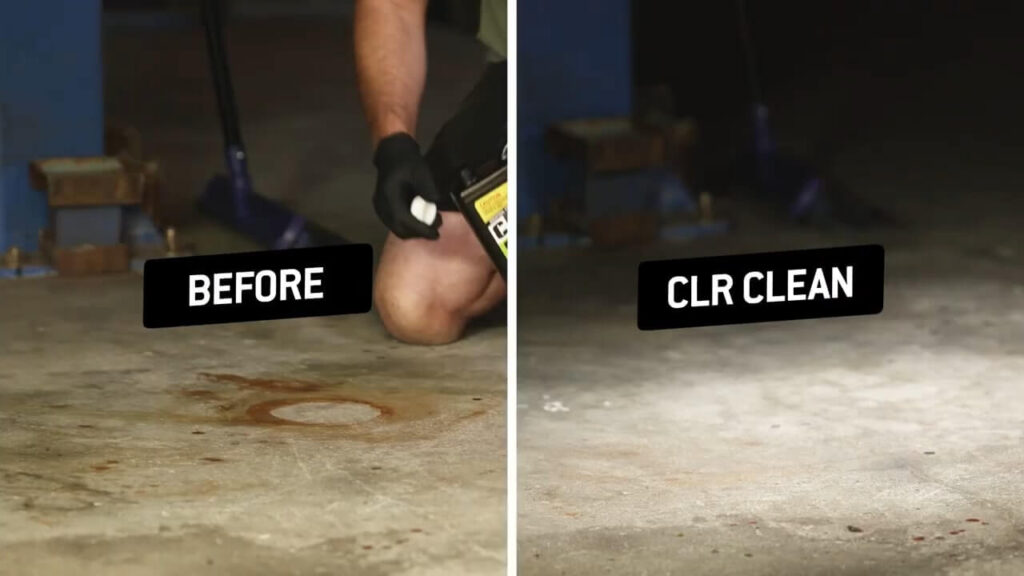Imagine walking out to your concrete patio, only to encounter unsightly rust stains disrupting its smooth, clean surface. You’re not alone, and fortunately, we’ve got tried-and-tested solutions for you.
This article will guide you on how to remove rust stains on concrete. From simple home remedies to commercial products, step-by-step instructions will help you restore the beauty of your concrete.
Whether you’re dealing with a small blemish or a stubborn old stain, we’ve got you covered.
Key Takeaways
- Try using everyday items like vinegar or lemon juice to lift light rust stains or go for stronger store-bought cleaners for the tough ones.
- Protect yourself with gloves and safety goggles and keep the area ventilated when using chemical rust removers.
- Scrub properly with a gentle brush and rinse the area well after applying your rust remover to avoid harming your concrete.
- For especially hard-to-remove rust stains, consider using a pressure washer to rinse and blast the rust away without damaging the surface.
- Keep rust from coming back by applying a concrete sealer regularly, keeping metal objects off the surface, and cleaning regularly to catch rust early.
What Causes Rust Stains on Concrete?
If you’ve noticed those unsightly orange-brown streaks on your garage floor, driveway or patio, and other concrete surfaces, those are rust stains, a common problem that’s often tricky to tackle.
Rust stains occur when iron or metal objects come into contact with moisture and oxygen, resulting in oxidation. This reaction leaves behind a stubborn stain that’s difficult to remove.
It’s not just metal patio furniture or tools causing the issue. Even certain fertilizers can deposit minerals that lead to rusting. You’ll find rust stains on driveways, walkways, patios, or any concrete surface exposed to these elements.
But don’t worry, removing it is not an impossible task. With the right knowledge and tools, you can effectively tackle these stains.
Preparing the Concrete for Cleaning
Before you start dealing with those stubborn concrete stains, it’s crucial to properly prepare and clean the surface.
First, clear the area of any furniture or items that might be in the way. Then, with a broom or a scrub brush, sweep away any loose debris or dirt. It’s essential that the surface is as clean as possible to ensure the rust remover can do its job effectively.
Next, pre-soak the rust stains with water. This step helps to loosen the particles and makes the stain easier to remove.
Choosing the Best Rust Cleaner to Remove Old and Minor Stains
Now that your concrete surface is clean and ready, it’s time for you to pick the right rust-stain remover to remove stubborn rust stains from concrete. You have a few options to consider.
- For lighter stains, household products like vinegar or lemon juice can work wonders. Just apply, allow it to sit for a few minutes, then scrub away.
- For tougher stains, you will likely need a commercial rust remover. These are specially formulated to tackle rust, but they’re also more potent, so be sure to follow the instructions closely.
Solution 1: Home Remedies & Natural Ways to Remove Rust Stains From Concrete

You might prefer natural methods to remove rust on concrete, especially if you’re keen on avoiding harsh chemicals.
Many items in your pantry can double as effective rust stain removers. For instance, both lemon juice and white vinegar are naturally acidic, which can help break down rust.
Here’s a quick rundown of eco-friendly rust removal options:
- Lemon juice: Its citric acid works wonders on minor stains. Apply, let sit for 10 minutes, then scrub away.
- White vinegar: Also effective for light stains, it needs 7 to 10 minutes of sit time before scrubbing.
- Baking soda: Mix with water to form a paste, apply to the stain, let it sit for an hour, then rinse.
- Salt and lemon: This combo, when applied for 2-3 hours, can loosen stubborn stains.
- Potato and dish soap: Cut a potato in half, dip it in dish soap, then rub it on the stain.
If the stain persists, repeat the process for best results. Remember, always test these methods on a small, hidden area first to ensure they don’t discolour your concrete.
With patience and a little elbow grease, you’ll have your concrete looking as good as new.
Solution 2: Commercial Rust Remover For Concrete

If home remedies aren’t doing the trick, you can turn to commercial rust removers to tackle those stubborn stains on your concrete. These products come in various forms and work effectively to break down and lift off rust.
Acid-Based Cleaners
These are powerful and can eliminate even deep-set stains. Always follow the manufacturer’s directions to avoid damaging your surface.
Oxalic Acid Cleaners
Another effective option, especially for stubborn stains. Remember to rinse thoroughly after use to prevent discolouration.
Trisodium Phosphate (TSP) Cleaners
These can be diluted with water and used to scrub away rust. They’re excellent for extensive and persistent stains.
Products like WD-40 Specialist Rust Remover Soak, RustAid, and Krud Kutter are specifically designed to tackle tough rust stains, and you can find them at most hardware and home improvement stores or online.
Safety Precautions With Chemical Removers
When using chemical rust removers, it’s crucial to take certain safety precautions to protect yourself and your surroundings.
- Always work in a well-ventilated area to avoid inhaling harmful fumes.
- Wear protective gear like gloves, goggles, and a face mask to prevent direct contact with skin, eyes, and your respiratory system.
- Don’t forget to cover up surrounding vegetation and objects, as some removers can cause damage.
- Never mix different cleaners, as it can lead to dangerous chemical reactions.
- Always test a small inconspicuous area first to ensure the remover won’t discolor or cause damage to the concrete.
- Carefully follow the manufacturer’s instructions for use and disposal, and keep these products out of reach from children and pets. Safety should always be your priority.
Solution 3: Utilizing CLR to Remove Rust From Concrete

CLR, an acronym for Calcium, Lime, and Rust, is a powerful cleaning solution that doesn’t contain phosphates. It’s considered a safer chemical rust remover option.
CLR Calcium, Lime, & Rust Remover is also simple to use:
- Just apply it directly on the stain.
- Let it sit for a couple of minutes.
- Then scrub it with a stiff brush to get rid of rust stains.
Always remember to wear gloves and safety gear when using it.
A few precautions to keep in mind: Don’t use CLR on coloured or sealed concrete as it might damage the surface. Also, do a patch test in an inconspicuous area first to make sure it won’t discolour your concrete.
- Finally, rinse thoroughly to ensure no residue is left behind.
Scrubbing Techniques for Concrete
When tackling rust stains on concrete, you’ll want to use the right scrubbing techniques to effectively remove the stains without damaging the surface.
Consider these steps:
- Always start with a mild scrubbing tool like a nylon bristle brush. This helps avoid scratching the concrete.
- Apply your chosen rust remover, then let it sit for a few minutes to break down the rust.
- Scrub the area in a circular motion. This technique can help lift the stain from the concrete.
- Be patient. It might take a few rounds of applying the rust remover and scrubbing.
- Once you’re done scrubbing, rinse the area thoroughly. Any leftover rust remover can cause damage if left on the concrete.
Solution 4: Using a Pressure Washer for Stain Removal

What if rust stains are too stubborn for CLR or other cleaners? A pressure washer might be just what you need.
- Prepare: Ensure the area around the stain is cleared of objects that could get damaged. Put on protective gear to avoid getting splashed.
- Pressure wash: Direct the pressure washer to the stain. The high-pressure water will blast the rust away. Be mindful to keep the washer moving to avoid etching the concrete.
- Inspect and repeat: Inspect your work. If the stain persists, repeat the process.
Rinsing and Post-Cleaning Steps
Proper rinsing is your next crucial step in ensuring all rust-removing solutions are thoroughly washed off the concrete surface to prevent any potential damage.
Use a garden hose or pressure washer, making sure you’re not leaving any residues behind. This step can’t be overlooked, as leftover chemicals can cause harm to your concrete over time.
After rinsing with warm water, allow the surface to dry thoroughly. If rust stains persist, you might need to repeat the cleaning process or try a more potent rust remover.
Lastly, remember to inspect your concrete for any signs of damage. If you spot cracks or chipping, it’s time to apply a concrete sealer. This not only protects against future rust stains but also extends the lifespan of your concrete.
Tips to Prevent Rust Stains
Prevention is always better than cure, and with a few simple steps, you can keep your concrete looking clean and rust-free. Here are some proven strategies to prevent future rust stains:
- Regularly seal your concrete surfaces. This provides a protective barrier against rust.
- Avoid placing metal objects on the concrete. If unavoidable, ensure they’re rust-free or painted with rust-resistant paint.
- Routinely inspect your concrete for early signs of rust. Early intervention can prevent a full-blown stain.
- Consider using rust inhibitors or rust-resistant paints on your concrete.
- Keep your concrete surfaces clean; regular cleaning can prevent a rusty surface.
Should rust marks appear despite your efforts, don’t worry – the specialists at Stone Protection are ready to assist, ensuring your concrete’s restoration and your own comfort.
FAQs About the Best Methods to Remove Rust on Concrete
How do you remove brown stains from concrete?
To tackle brown stains on concrete, which are often rust, begin with dish soap and water to see if the surface grime lifts. If the stain persists, use a rust remover product that can penetrate inside the concrete, like one with hydrochloric acid, ensuring you follow safety guidelines. For tough or old rust stains, it may be necessary to learn how to remove rust with a more powerful method.
Does CLR damage cement?
No, when used according to the manufacturer’s directions, CLR (Calcium, Lime, and Rust Remover) is generally safe for cement. However, it’s crucial to test on a small area first, especially if dealing with painted concrete or surfaces exposed to the elements.
Will bleach remove rust from concrete?
While bleach can be used to remove minor rust stains, it’s not the best method for major stains as it doesn’t effectively penetrate and dissolve the rust within concrete.
Does WD-40 remove rust?
Yes, WD-40 can be utilized to loosen and help remove rust from various surfaces. However, for rust penetrated deep into concrete, a specialized rust remover may offer a better solution.
What is the best cleaner for rust stains on concrete?
The best cleaner for rust stains on concrete will contain ingredients that penetrate the concrete to break down the rust. Products with oxalic or hydrochloric acid tend to be effective. Evaluate the severity of the stain to choose the appropriate cleaner.
Does vinegar remove rust?
Vinegar, with its acetic acid content, can be effective at removing minor rust stains, as it can help dissolve the rust. For more substantial rust removal, a stronger acid or dedicated rust remover might be necessary.
What dissolves rust quickly?
Hydrochloric acid is known for its ability to dissolve rust quickly, but it should be used with caution. For safer household options, products with oxalic acid or phosphoric acid can also be potent against major stains, while penetrating the rust inside the concrete. Always follow safety instructions when using chemical rust removers.





